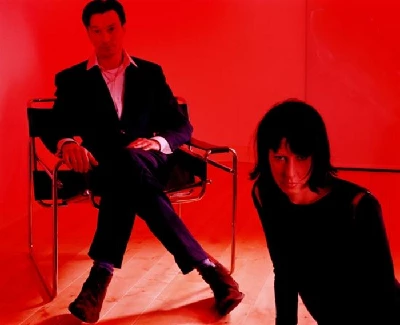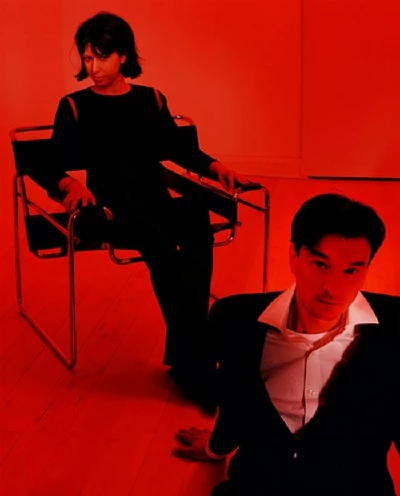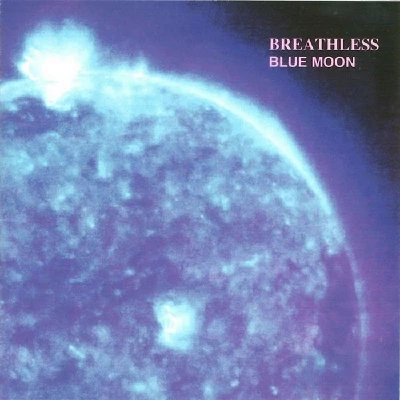published: 10 /
4 /
2016

Lead singer Dominic Appleton of London-based quartet Breathless speaks with Carl Bookstein about music and the current re-release of their 1999 album 'Blue Moon'
Article
London-based band Breathless have just re-released their epic, atmospheric double 1999 album 'Blue Moon'. The results are rich and evocative. Their last album, 2012’s 'Green To Blue', was also something of a masterpiece in melancholia.
Singer Dominic Appleton’s vocal stylings are always remarkable. In the 1980s, Appleton was a featured vocalist with the acclaimed collective This Mortal Coil.
Melancholia is by Appleton’s own testament what Breathless do best. Their music is soulful, healing and therapeutic like a warm blanket. I feel greatly rewarded to have spoken a second time with Dominic Appleton about Breathless, music, his thoughts, attitudes and more. Uniquely talented, Breathless is a band to believe in.
PB:How was it decided that 'Blue Moon' would be re-released at this time?
DA: 'Blue Moon' was first released in 1999 and was the first Breathless album to come out on CD. It’s a long album but we could fit it all on to one CD. At the time I think people were doing that. I felt like we were taking advantage of the CD format. As soon as it was released we were already discussing how it would work better as a double album, particulaly a vinyl album that would break it up into four parts. It’s a very dense album and it’s pretty heavy going to listen to in one sitting, vinyl is its perfect format. In 1999 virtually no one was buying vinyl. They are now thankfully.
PB: The great song 'Goodnight' has a lyric “till the comfort drowned me”. Somehow Breathless’ use of melancholia in music creates deep comfort. Is that intentional?
DA: Ha, you’re making me think of Joni Mitchell: “There’s comfort in melancholy, when there’s no need to explain. It’s as natural as the weather in this moody sky today” ('Hejira'). I think that’s what Breathless do best. In the past people have criticised us for our melancholy sound and I felt defensive about it and tried to justify it. I just don’t care now, the fact is that’s what we do and what I love about what we do. The bulk of the music I listen to is melancholy and I know Ari and Gary are the same. I listen to pop music too when I feel like it and I enjoy it a lot but it’s a different kind of listening.
I don’t understand why people find melancholia a negative thing in music. I think it’s positive, it’s reflective and thoughtful, it’s complex and it’s wonderfully indulgent and emotional. It’s not wallowing in self-pity, it’s losing yourself in self-reflection and nostalgia. If people find what we do depressing that’s their problem! I suggest they go and listen to some dance music and cheer the fuck up!!!
PB: You have said 'Blue Moon' is “our most lo-fi and experimental record". Can you speak to how this record became more experimental than the others in your catalogue and whether this is an approach you will return to?
DA: It’s experimental in the sense that a lot of the album is live recordings. Essentially, you are hearing the songs as they were being written. I hope we’re experimenting all the time, it’s just that on this album, rather than reworking and refining the songs, we just edited down the live recordings and added vocals later. It’s a great way to record and I’d love to work that way again. We had a fantastic set-up then, where we wrote was a recording studio and it allowed us to do that. Sadly, like so many wonderful places in London, that studio has closed down now to make way for yuppie apartments. Hopefully we’lll find a similar set-up again.
PB: In the opener, 'Walk Down To The Water', you speak of watching your shimmering friends go. Is this a description of sea life, and is this something that personally moves you?
DA: I love to be near water and I realise I reference it in our songs a fair amount. Let’s face it, staring out over the ocean is an awe-inspiring thing to do. It’s so massive and powerful, it stirs up a ridiculous amount of emotions in me. I can’t help but turn in on myself. Funnily enough, I was in Sri Lanka recently and saw whales jumping out of the water, I felt so lucky. That was a really emotional experience.
'Walk Down To The Water' isn’t about sea life though, I was actually being metaphorical. I wrote that lyric at a time in my life when I was acutely aware of how driven and ambitious a lot of my friends were. I’m not a particularly ambitious person. I’ve always done what I wanted to do and I’m content doing just that. I don’t have a constant craving for things to be bigger and better. I’m glad, I think too much ambition can make people feel unsatisfied all the time. I’m not lethargic; I guess I’m just easy to please, ha ha. At that time, what felt like a lack of drive made me feel a bit inadequate, like I was being left behind while they were setting off on grand life voyages. That song’s just me thinking all those things through.
PB: 'Green Finger Swinger' sounds like pure jazz. Is jazz an important influence for Breathless?
DA: It is jazzy, isn’t it, but I wouldn’t say jazz is much of an influence in what we do. I’ve got a couple of Miles Davis albums and Dave Brubeck. I like the way jazz musicians approach music and the experimentation. I think there are parallels in their method with what we do but oh my, what a racket they can make. In my twenties I really tried, I got Charles Mingus' 'Mingus Ah Um' and I played Side One over and over until I knew every note. It’s brilliant, it’s interesting and exciting too and I can see how people must drift away on it, but it’s just not for me. Just not emotional enough. I never did make it to Side Two.
I do love Nina Simone. Really, really love her. Billie Holiday and Peggy Lee too, but I don’t really think of them as jazz singers, just amazing singers. Nina Simone was one of the most astonishing performers I’ve ever seen.
PB: You were a featured vocalist in the acclaimed musical collective This Mortal Coil. Does that accomplishment still bring joy and reflection at this point in your career?
DA: Yes, I was thrilled to be asked to contribute. 'It’ll End In Tears' was an incredibly seminal album for me. It was so inspiring, it introduced me to artists I’d never heard before and its success spurred me on to make music. Obviously, loving the first album so much , I was really overwhelmed to be asked on to the second one. I can remember that I couldn’t catch my breath when I was asked. I was astonished.
PB: Your 2012 album, 'Green To Blue', was a knockout. Did that recording in any way chart an upcoming direction for the band?
DA: I think the last album always has an influence on the next album – like a reaction to it once it's been released and the dust has settled. You always want more of something and less of another. I think when I last spoke to you we talked about how a lot of 'Green To Blue' was written in a different way to previous albums, with each of us contributing fully written songs rather than jamming on loose ideas. There’s definitely more of that but we also want to experiment with the jamming session style from earlier albums too.
PB: Touring I know is not your personal favorite endeavour. Any new upcoming shows slated at this point?
DA: There’s nothing planned at the moment. To be honest I’m quite pleased about that as we’re pretty focused on writing at the moment. We don’t want to take another eight years to release the next album!
PB: Your vocals are a remarkable, evocative instrument. You mentioned in our last interview that after over 25 years of singing you began voice lessons for confidence. Was that helpful?
DA: I think it did help my confidence a little bit, but not enough to make me want to perform live in a hurry! I hate being the centre of attention, so singing in a band was probably the wrong career choice for me. Funnily enough I’m half way through Tracey Thorn’s book ‘Naked At The Albert Hall’. It’s absolutely fascinating to read about so many singers' fear of performing and their doubts about their voices. Someone like Dusty Springfield, whose voice was sublime in my opinion, really struggled. Tracey Thorn herself hasn’t performed for over 15 years.
PB: Do you have a personal favourite album from the Breathless catalogue?
DA: No I don’t. I’m proud of all of them in some way and I’d like to change all them too. That’s not a bad thing to feel, I think it spurs you on to write new stuff – always wanting to make things more beautiful than what’s gone before. I have favourite songs like 'Goodnight' and 'Behind The Light'.
PB: Are you currently working on a new Breathless album? How is that going?
DA: Yes, we’re writing at the moment and it feels like a very inspired period. I’m really excited.
PB: Thank you.
Band Links:-
http://www.tenorvossa.co.uk/pages/Brea
https://en.wikipedia.org/wiki/Breathle
Play in YouTube:-
Picture Gallery:-

